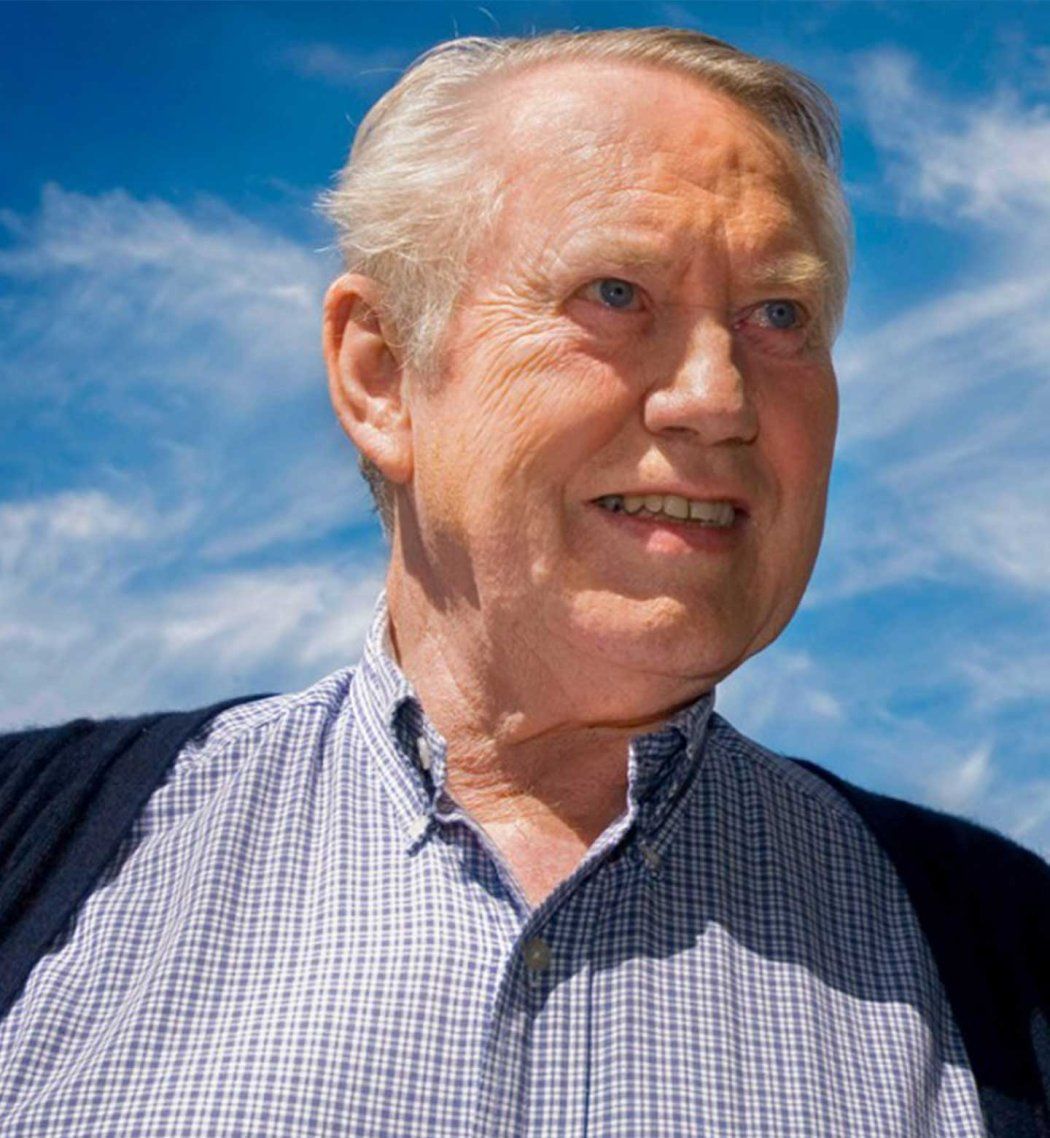Charles “Chuck” Feeney, one of UCSF’s greatest supporters and friends and the man Forbes magazine named America’s most generous philanthropist, passed away on October 9, 2023, at the age of 92.
Chuck was a humble man – for years, he gave away his billions anonymously. Chuck wanted to be called by his nickname, and he tried his best to look ordinary in modest blazers and drug store glasses. Yet Chuck was anything but ordinary.
“Quiet, driven, principled, humble, caring, visionary, courageous – those are words that describe Chuck Feeney,” said former UCSF Health president and CEO Mark Laret. He met Chuck for the first time while giving him a tour of Mission Bay, which at the time was a vacant lot with weeds and an old warehouse. “I dropped Chuck off at his house afterward, and as he got out of the car, he said, ‘Well, a big project like this is going to take a big gift to get it going, and that’s what I intend to do.”
Foundational Support
“Mission Bay would not exist without Chuck Feeney,” said UCSF Chancellor Sam Hawgood. “He envisioned what this campus and this neighborhood could be before any of us could imagine such a transformation. Mission Bay vaulted UCSF into the highest echelons of biomedical research and revitalized an entire quadrant of the city.”
Chuck made his fortune as a co-founder of the Duty Free Shoppers Group, which pioneered the concept of duty-free shopping. Since stealthily founding his charity, Atlantic Philanthropies, in 1982, Chuck’s mission was to give away all of what he described as his “undeserved wealth” to causes he believed in before he died. To that end, Atlantic Philanthropies made its final grants in December 2016, having given away $8 billion in total. The funds have gone to improving education, health, science, children and youth, and human rights across five continents.
UCSF will be forever grateful for being a cause Chuck believed in. He gave more than $600 million to UCSF through the years – and is amongst the most generous donors in the UC system’s history.
“Chuck was one of the great world citizens. Whether we’re talking about Nobel laureates or great political leaders who have influenced the 21st century, Chuck Feeney is among them in terms of impact,” said Hawgood. “To be honest, I don’t think anyone but Chuck knew the totality of what he did because he was such a humble man.”
Chuck invested where he thought he could do the most good. His generosity had a deep and wide impact on people the world over who are struggling with neurodegenerative disorders like dementia. Knowing that our country, and many across the world, face a siege of dementia as populations age, Chuck gave $177 million to establish the Global Brain Health Institute. Through the initiative, UCSF trains international leaders to use their expertise and translate scientific and clinical knowledge to develop brain health programs in their home countries.
One of the rare philanthropists who invested primarily in bricks and mortar, or buildings and infrastructure, Chuck generously supported the building of the Cardiovascular Research Institute, the Helen Diller Family Cancer Research Building, the Sandler Neuroscience Center, the UCSF Medical Center at Mission Bay, the Global Brain Health Institute, Mission Hall, the Joan and Sanford I. Weill Neurosciences Building and the Nancy Friend Pritzker Psychiatry Building.
His $125 million matching gift also gave UCSF the capacity, credibility, and momentum to garner enough additional funding to build UCSF’s 289-bed hospital complex at Mission Bay, which includes UCSF Benioff Children’s Hospital San Francisco, UCSF Betty Irene Moore Women’s Hospital, UCSF Bakar Cancer Hospital, and the UCSF Ron Conway Family Gateway Medical Building. In recognition of his outstanding dedication, he received the UCSF medal in 2012 and the University of California Medal in 2015.
“Chuck gave us money to build buildings and would tell us to use them as matching grants for someone else to put their name on them,” said Laret. “He wanted no credit. His satisfaction was inside. He knew that those facilities made it possible for UCSF to recruit some of the best scientists in the world who would not have come here without that investment.”
Opportunity was important to Chuck. He gave generously to fund scholarships for students who either couldn’t otherwise afford a UCSF education or would be overburdened by debt upon graduation. (Scholarship support also enables UCSF, as a public school, to compete for the best and brightest students who are being offered debt relief from other, more deeply endowed private institutions.) Chuck also gave generously to support research for new investigators in the neurosciences – a cadre of promising young faculty that faces strong funding restraints from the National Institutes of Health.
Chuck was a founder of the “Giving While Living” movement. This “Feeney way” of giving encourages people to devote their good fortune in life to benefit others and, if wealthy, to use the money to tackle urgent problems today. “Give it away today, and you can see what it is going to do and modify your mistakes,” he said. “I think you do get satisfaction out of something that happens in the world on your watch. The world is full of a lot of people who have less than they need. And each time you can address their problem, you can help them move forward and to feel life can change and I can change it.”
“We haven’t even begun to see the impact of Chuck Feeney’s generosity,” added Hawgood. “Years from now, his impact will be measured by what has not happened – millions of people won’t develop Alzheimer’s, and countless others will not live in poverty because of all the investments he made in neurodegenerative disease research, education and opportunity. An immeasurable legacy, isn’t that just like Chuck?”
